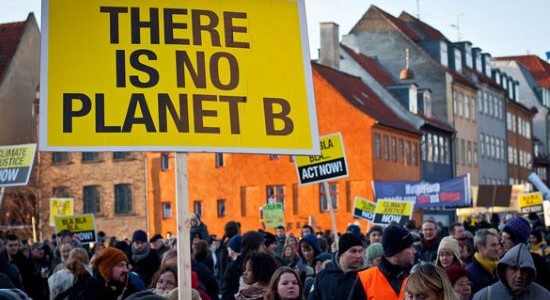Climate justice temporalities in Denmark (JusTiDe)
The JusTiDe project aims to provide an integrated analysis of how climate justice commitments produce new types of legitimacy and temporal imaginations in the Danish political landscape.

The overarching research question is: How has climate justice produced new temporal imaginaries in the Danish contexts of sustainable welfare, civil society engagement, and global leadership ambitions?
The role and the influence of climate justice in Danish climate politics has not been subjected to deeper scrutiny in cultural, political, and social research, despite the Climate Act’s commitments and the growing international interest in the Danish climate policy debate.
With an investigation of discourses and practices of climate justice in the Danish context, JusTiDe seeks to address this lack of knowledge and to expand the field with a focus on how temporal imaginaries relate to political agency in climate justice deliberations, mobilisations and diplomacy.
This sub project investigates how global and national conceptualizations of justice are performed and contested in the Danish climate politics arena through an engagement with activists’ strategies, tactics and impacts. The overall aim is to clarify the types of agency informed by the temporal imaginaries of climate justice that are emerging from the bottom-up and their effects on the broader Danish debate on climate justice. A specific attention is paid to the dynamics of escalation of tactics and of criminalization of activists.
Thus, the sub-project engages with climate activism, mobilisations and protests in Denmark to better understand how political conflicts around climate change are changing the terrain of environmental politics while affecting the scope of democratic protest and the strategies of social movements. The sub-project will be based on engaged ethnographies of movements and protest events, on interviews and participant observation, and on collaborative knowledge production through the Climate Justice Labs.
Responsible researcher
This sub project investigates the cultural and economic potentials and conflicts surrounding climate justice principles in a welfare society. Danish political debates on climate mitigation speeds have revolved around fears of creating "yellow vest"-type protests based on perceptions in lower-income groups that climate policies will be an unjust burden on them.
Thus, the sub-project investigates the challenges for Danish welfare politics resulting from the demands for accelerated decarbonization. In other words, it analyses the tensions between notions of social justice integral to the Danish welfare state and the globally-oriented principles of climate justice advanced by civil society groups and scientists.
Responsible researcher
This sub project places Danish policy positions on climate justice in the context of past and present ideas of international climate leadership. From the first Danish climate legislation in 1990 until the 2020 Climate Act, Danish climate policies have had explicit aims to create a justice-based decarbonization pathway for other nation-states to follow.
With an empirical focus on the global UNFCCC-oriented debates and their relevance to Danish climate commitments, SP3 aims to document and explain how Danish decision-makers and civil society groups have developed different temporal imaginaries for the green transition in the context of global climate negotiations.
Responsible researcher
Researchers
| Name | Title | Phone | |
|---|---|---|---|
| Salvatore Paolo De Rosa | Postdoc | +4535334491 | |
| Stefan Gaarsmand Jacobsen | Associate Professor |
Funding
The project is funded by the Carlsberg Foundation and runs from 2023-2026.

